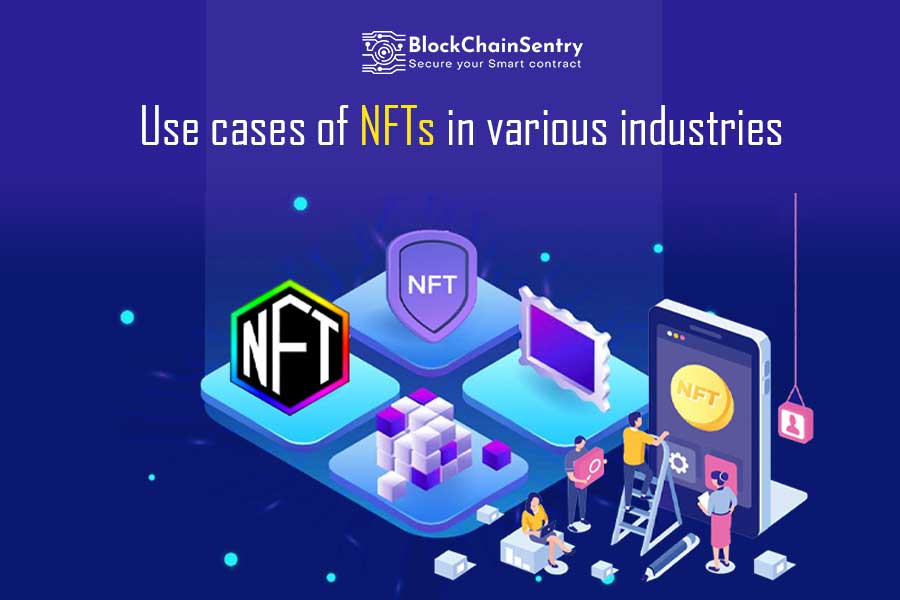Use cases of NFTs in various industries

We are already familiar with the term NFT, and many industries are now creating digital artworks to obtain notoriety and appeal to younger consumers. The world's top companies, including Microsoft, Nike, Starbucks, Coca-Cola, Tesla, Gucci, Home Depot, etc., have launched and started their NFT projects.
In our previous articles, we have discussed various cyber hacks in NFTs, how to demystify security issues of NFT projects and how dynamic NFTs will create numerous use case possibilities for businesses.
Research and Markets predict that the global NFT market will grow at a CAGR of 40.2% from $14.02 billion in 2021 to $82.43 billion in 2026. According to DappRadar.com, NFTs generated more than $1.5 billion worth of transactions in the first quarter of 2021, representing an increase of 2,627% from one quarter to the next. With examples from everyday life, we will examine the unknown use cases for NFTs in this blog post.
Digital Art and Collectible
NFT’s first use case was in digital arts and collectibles. Individuals can use NFTs to signify ownership of digital assets, such as music, artwork, and videos. This lessens piracy and guarantees that authors are fairly paid for their work.
One well-known NFT collectible is crypto punks created on Ethereum with the ERC-721 standard. They have over 10,000 original NFT artworks, making them one of the earliest examples of non-fungible tokens. The price of CryptoPunk #5822, which dwarfed some of the other most valuable NFT collectibles, was almost $24 million in Ethereum in February 2022.
Supply Chain, Trade, and Finance
The best known application of NFTs to date has been converting digital works of art into assets that can be purchased at a premium price. Commerce and supply chain financing has more practical use cases of NFTs. NFTs can symbolize the possession of tangible goods like cars or real estate etc. This helps people monetize their assets in novel ways and develop a new market for them.
According to Jean-Baptiste Gaudemet, senior vice president of data and analytics at treasury software vendor Kyriba, NFTs can resolve the issue of financing extensive supply chains by using the tokens. He suggested that the solution is to tokenize the ultimate buyer's payment assurance in the form of an NFT and to provide a financial mechanism via a spread coded into the NFT smart contract to incentivize suppliers to send the NFT along the supply chain to their suppliers.
Logistics
In another use case, NFT is used to produce digital footprints in the form of token ID that is attached to the item throughout its existence, rather than the lengthy, vast, and complex paper trails that accompany transactional ownership and activity of a range of goods. The data contained in each NFT's metadata, which points to priceless digital assets that are updated in real-time on the blockchain, precisely defines the uniqueness of each NFT.
By allowing participants to access the same immutable record on the ledger, NFTs can minimize and possibly even eliminate information flow inconsistencies between parties. The transparency and immutability of the blockchain guarantee the supply chain data's dependability and validity. As a result, NFTs can improve efficiency and save costs associated with finding and procuring the goods and services a firm requires. NFTs also produce a complete picture of a part's position, amount, and other vital details.
For example, the British business Provenance started using blockchain to ensure that the tuna fish it had just purchased were not taken illegally. The business tracks the flow of tuna while managing its capture and distribution using blockchain technology.
Identity Management
When it comes to managing one's own identity, NFTs can be very beneficial. Identity tokens include specific information. These tokens can be used to prove credentials and provide proof of education, certification, health, and other records. As an NFT that can be linked back to the owner, the certification can be distributed throughout the blockchain.
NFTs may end online anonymity, but having a fully verified network has many advantages, such as a decrease in fraud, crime, and even offensive comments. The blockchain provides complete visibility into who has access to data and where the data goes, and even facilitates compensation each time data changes hands if the proper smart contracts were in place on NFT-verified online identity.
Political Cause
Not simply the artwork alone!, even political candidates use NFTs for fundraising and to draw in young supporters. NFTs have played a significant role in the Ukrainian government's efforts to finance cryptocurrency assets to fend off the Russian invasion. The cryptocurrency fundraising campaign Ukraine DAO sold an NFT of the Ukrainian flag for $6.75 million, making it the tenth most expensive NFT sale ever.
Future of NFTs
We'll likely see more concepts and use cases as NFTs gain popularity. Not all applications for NFTs have yet had the time to develop past an initial idea or modest prototype. There are several NFT use cases outside the art world, even though most non-fungible tokens are still utilized in digital market artworks. NFTs can help brands in various industries by providing a new revenue stream, increasing consumer satisfaction, and bringing innovation. Companies will use NFTs soon to tokenize any real-world asset.